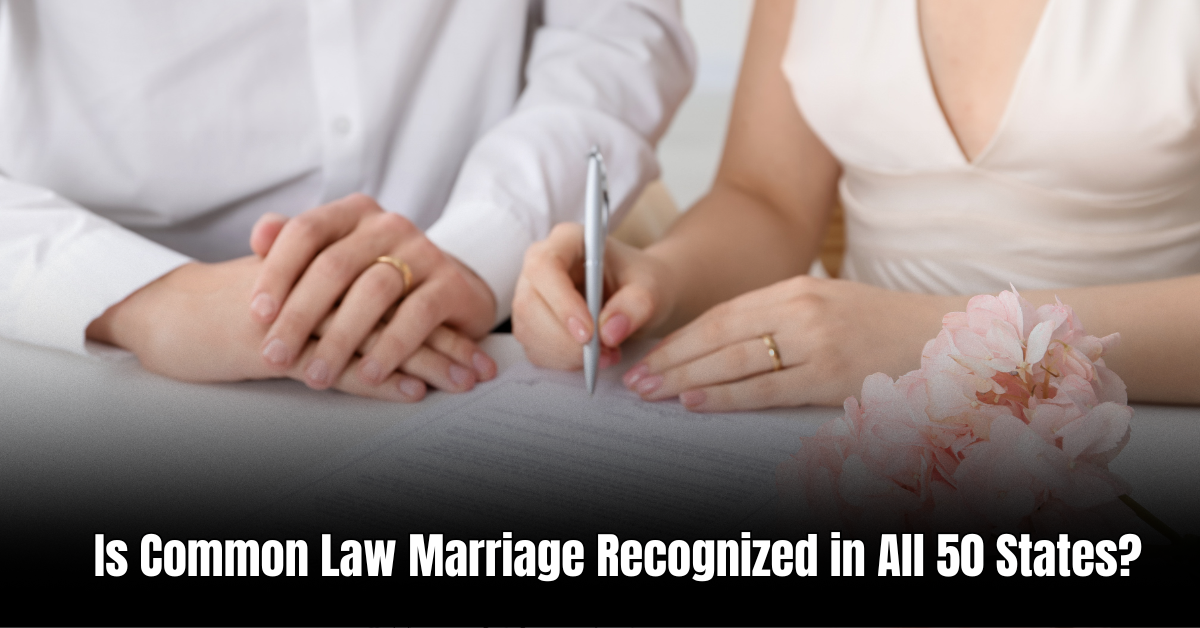Common law marriage is not recognized in all 50 states of the United States. Only a select few recognize these non-ceremonial unions.
Common law marriage, an informal form of union without a traditional wedding, is only acknowledged by a handful of states today. This practice was more prevalent historically, but as legal requirements for marriage have become more standardized, common law marriage has become less common.
Couples often believe that simply living together for a certain period constitutes a common law marriage, but this is a misconception. The reality is more complex, and specific conditions must be met for a common law marriage to be legally recognized. Understanding the nuances of common law marriage is essential, especially if you cohabit with your partner and assume you have the same rights as legally married couples.
Understanding Common Law Marriage
Common law marriage is an informal form of marriage that is recognized based on the couple living together and holding themselves out to the public as husband and wife without having gone through a formal civil or religious marriage ceremony. Such arrangements date back to the colonial days of the United States, where traveling to find someone authorized to perform a wedding was sometimes difficult. Over time, such marriage practices were recognized by some states to address such situations and provide legal benefits.
Currently, the recognition of common law marriage varies by state, meaning that not all 50 states accept such unions. Only a handful of states recognize common law marriages contracted within their borders, and the specifics of recognition can differ significantly from one state to another. These states often require that the couple cohabitate for a certain period, intend to be married, and present themselves to the public as a married couple.
Additional rows can be added for other states
| State | Status of Common Law Marriage |
|---|---|
| Colorado | Recognized |
| Texas | Recognized under specific conditions |
| Alabama | Not recognized |
| New York | Not recognized |
Common Law Marriage In The US
Common law marriage, a form of non-ceremonial marriage, is not recognized in all U.S. states. Only a handful of states provide legal recognition to common law marriages, and each has its own criteria for validation. Understanding these regulations is crucial for couples who consider themselves married without a formal ceremony or documentation.
States such as Colorado, Iowa, Kansas, Montana, New Hampshire, South Carolina, Texas, and Utah acknowledge common law marriages. But it’s important to note that New Hampshire recognizes it only for inheritance purposes. A significant connection between the states is the requirement for couples to hold themselves out as married, including cohabitation, intent to be married, and public acknowledgment of the marital relationship.
| State | Requirements |
|---|---|
| Colorado | Cohabitation, intent and reputation |
| Montana | Cohabitation and reputation |
Please note that the provided table includes only a sample of states and requirements. The full list of states that recognize common law marriage and their specific requirements is more extensive.
Debunking Common Misconceptions
Common law marriage is not acknowledged uniformly across all U.S. states, leading to a patchwork of recognition that can significantly impact couples’ lives. Some states, such as Colorado and Texas, accept common law marriages with specific criteria, while others do not recognize them at all. One notable misconception is the belief that a couple automatically enters into a common law marriage after living together for a set number of years. This is not true, as states that do recognize common law marriage often require clear intention to marry, cohabitation, and public presentation as spouses.
For those in a common law union, legal rights and protections vary considerably when contrasted with those of traditionally married couples. Common law spouses may struggle with rights related to inheritance, property division, and even decision-making in medical situations. Therefore, it is imperative for such couples to understand their state’s stance on common law marriage and seek legal documentation to establish their partnership.
Couples located in states that do not recognize common law marriage face different implications. They must proactively secure their relationship through legal agreements, like wills or durable powers of attorney, to safeguard their interests and ensure their partnership is protected legally.
Frequently Asked Questions: Is Common Law Marriage Recognized In All 50 States?
What Is Common Law Marriage?
Common law marriage is an informal relationship that is considered a legal marriage without a formal ceremony or license, recognized in some states based on cohabitation and representation.
Which States Recognize Common Law Marriage?
As of my knowledge cutoff in early 2023, only a few U. S. states—such as Colorado, Iowa, Kansas, Montana, Texas, and Utah—recognize common law marriages.
Can Common Law Spouses Receive Benefits?
Common law spouses are typically eligible for the same benefits as formally married couples, including tax, health, and inheritance benefits, if the state recognizes their union.
How To Prove A Common Law Marriage?
To prove a common law marriage, couples may need to show evidence of cohabitation, joint finances, use of the same last name, and public acknowledgment of the relationship as akin to marriage.
Is Common Law Marriage Valid Across States?
Common law marriages legally established in one state are generally recognized by other states under the Full Faith and Credit Clause of the U. S. Constitution, though specifics may vary.
Conclusion
Wrapping up, common law marriage’s recognition varies across the U. S. Each state determines its own legal stance, with some upholding it and others not. To navigate these waters, individual research and legal consultation are crucial. Remember, understanding your state’s laws ensures your relationship’s legal footing is solid.
Ismail Hossain is the founder of Law Advised. He is an Divorce, Separation, marriage lawyer. Follow him.





Leave a Reply